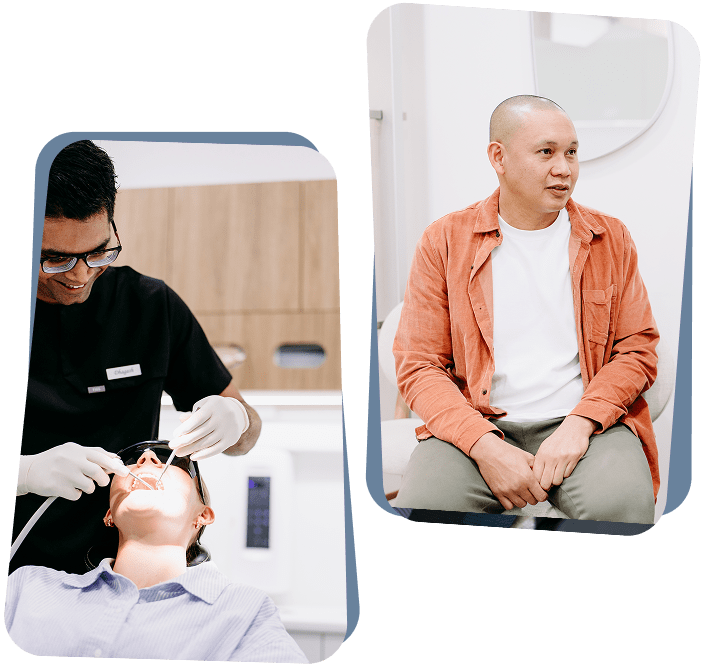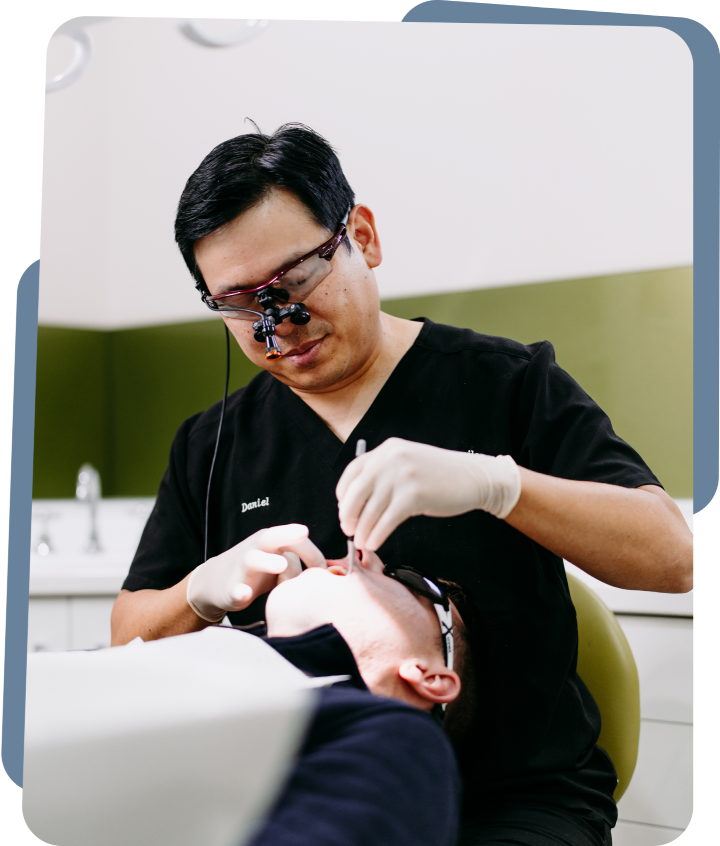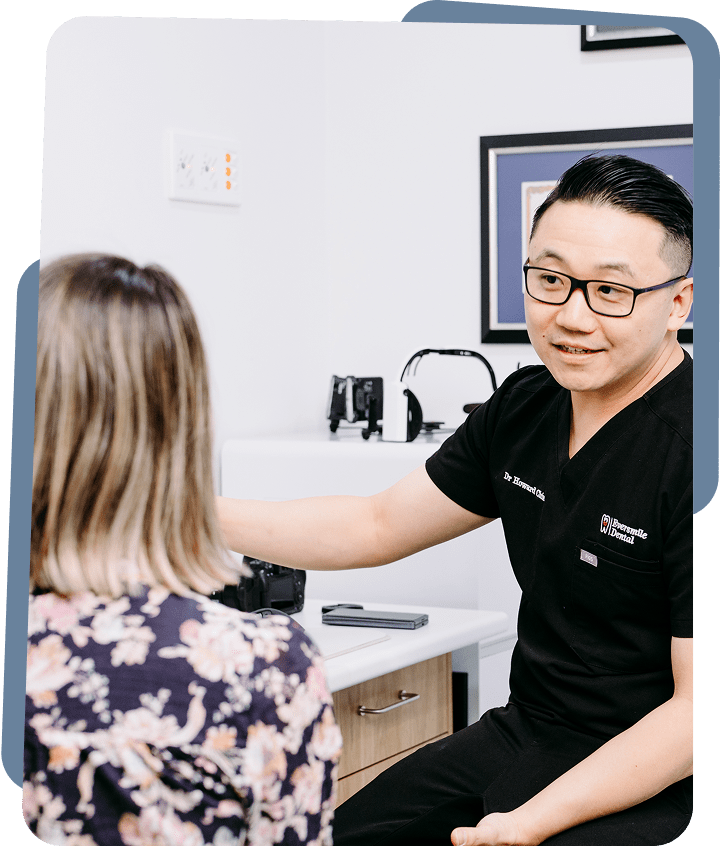Local Dentists. Personalised Dental Care.
Professional Wisdom Teeth Removal
in Bunbury

What to Know About Wisdom Teeth and Oral Health
When Should Wisdom Teeth
Be Removed?
- Impacted Teeth
Impacted wisdom teeth may not fully erupt. They can gradually push against nearby teeth, causing discomfort, swelling, or crowding. Dentists often recommend early assessment to reduce risks and monitor development.
- Gum Infection
Partially erupted wisdom teeth often create small pockets of gum tissue. These can trap bacteria and food, increasing the risk of infection. Patients may experience swelling, tenderness, or repeated flare-ups known as pericoronitis around the affected area.
- Tooth Damage
Wisdom teeth can press against nearby molars, causing structural damage. This pressure may increase the risk of decay or infection. Early evaluation helps identify risks before they lead to discomfort, damage, or more complex treatment.
- Cyst Formation
Impacted wisdom teeth can form fluid-filled cysts that may affect nearby bones, nerves, or teeth if not assessed early. Dentists may recommend removal when clinically appropriate, based on your symptoms.


Benefits of Removing Painful or Impacted Wisdom Teeth
- Relief May Be Experienced
Removing impacted wisdom teeth can, in some cases, reduce jaw pressure and discomfort. Individual outcomes vary, and your dentist will discuss the potential benefits and risks with you during your consultation.
- Lower Infection Risk
Impacted wisdom teeth can trap bacteria beneath the gums, potentially increasing the risk of swelling, infection, or discomfort. Dentists may recommend removal in some cases to support oral hygiene and reduce the risk of ongoing issues.
- Prevent Tooth Crowding
Impacted wisdom teeth can sometimes affect the position of nearby teeth. In some cases, removal may help reduce the risk of crowding; however, outcomes vary among patients. Your dentist will assess whether removal is clinically appropriate for your situation.
- Easier Oral Care
Because wisdom teeth are positioned far back in the mouth, they can be challenging to keep clean. In some cases, removal may make oral hygiene easier. Your dentist will discuss whether this is relevant to your situation.
Start with a Dental Consultation in Bunbury
Are you ready to prioritise your oral health? Book a consultation to discuss your oral health needs and treatment options.

Why Choose Eversmile Dental
-
- Proudly Bunbury Locals
- We don’t just work in Bunbury—we call it home. We raise our kids here, support local schools, and shop at the same weekend markets. We’re part of the fabric of this town, and we’re deeply connected with the people we serve. When you visit Eversmile Dental, you’ll be cared for by dentists who are part of the Bunbury community.
-
- Serving Since 2006
- Founded by Dr. Daniel Tham in 2006, Eversmile Dental has been part of Bunbury for nearly two decades, providing care for local families. We’re proud of our history and even more excited about where we’re heading as we continue caring for generations of local families.
-
- Dental Care for All Ages
- From a toddler’s first visit to helping grandparents maintain healthy gums, we tailor care for every age. We offer flexible appointment options and a supportive approach to make family visits easier. Our goal is to create a welcoming environment where dental care feels familiar and approachable.
-
- Personalised Care Plans for Your Needs
- You’re not just a number. At Eversmile Dental, we listen carefully, explain your options clearly, and work with you to create a plan that aligns with your goals. Whether you’re nervous, curious, or just want a second opinion, we’ll guide you with open communication and informed choices.
-
- Our Commitment to Professional Standards
- Honesty, integrity, and professional responsibility guide our care at Eversmile Dental. We clearly explain your treatment options and give you the opportunity to make informed choices without pressure. Our focus is on clear communication, professional advice, and delivering dental care in accordance with recognised standards.
-
- Modern Technology for Accuracy in Diagnosis and Treatment
- We’ve invested in modern dental technology, like 3D scanners, CBCT imaging, and EMS Airflow. Why? These tools assist with diagnosis and treatment planning in dental care.
Frequently Asked Questions
How do I know if I need my wisdom teeth removed?
If you’re unsure about removing your wisdom teeth, some signs may suggest it’s time to get them checked. An early assessment can help determine whether monitoring or removal is the most suitable option for your situation. Below are some common signs and findings that may indicate it’s time to see your dentist:
- Pain or Discomfort in the Back of Your Mouth:
You may notice pain or tenderness at the back of your mouth, especially when chewing or brushing near your molars. - Swollen or Red Gums Behind Your Molars:
Swelling or redness around your gums, especially near your back teeth, can be an early sign of gum irritation or infection. This often occurs when a wisdom tooth partially erupts, creating a space that’s difficult to keep clean. - Food Getting Stuck Often:
Food can easily become trapped at the very back of your mouth, near your hard-to-reach wisdom teeth. This makes cleaning difficult and may increase your risk of tooth decay or gum infection. - Digital Imaging Show Angled or Impacted Teeth:
Digital imaging (CBCT) may reveal impacted or angled wisdom teeth, which your dentist can monitor and assess for potential removal if clinically indicated. - Crowding or Pressure on Other Teeth:
Wisdom teeth can sometimes push against neighbouring teeth, leading to crowding or affecting previous orthodontic work.
For wisdom teeth removal in Bunbury, you can discuss your situation and receive individualised advice during a consultation with our dental team.
How painful is wisdom teeth removal, and how is pain managed?
We understand that many patients feel nervous about the potential pain involved with wisdom teeth removal. We hear this concern often, and we’ll guide you with clear, evidence-based information. Here’s what you can expect before, during, and after your wisdom teeth removal with a professional dentist in Bunbury:
Before the Treatment:
- You’ll have a thorough consultation, including CBCT (cone beam CT) scans, to assess the position of your wisdom teeth.
- We’ll explain your anaesthesia options; you may remain awake but should not feel sharp pain during treatment, although individual experiences may vary.
- If you’re feeling anxious, we’ll explain your sedation options in a calm, supportive manner during your consultation. We’ll also answer any questions you have to help you feel prepared and informed throughout the process.
During the Treatment:
- You may not feel pain during the procedure due to the anaesthetic, but it’s common to notice pressure or movement.
- Our team uses evidence-based techniques designed to promote effective recovery.
After the Treatment:
- Some discomfort, swelling, and jaw stiffness are common during the first few days after wisdom tooth removal. These symptoms are a normal part of the healing process and improve with proper aftercare and rest.
- Pain is typically managed with over-the-counter medications; however, we’ll provide you with tailored advice based on your health history.
- You’ll receive clear aftercare instructions, including tips on managing swelling and choosing soft, comfortable foods during recovery. We’ll also explain the symptoms to watch for, such as dry sockets, so you can feel informed throughout your healing process.
- We encourage patients to rest for two to three days after their wisdom teeth removal surgery. With appropriate aftercare, many people experience gradual improvement within several days, although recovery times vary between individuals.
At our dental clinic, we provide clear information about wisdom teeth removal and what to expect during recovery. We aim to support patients with evidence-based care and advice. If you have any questions or concerns about pain or healing, please don’t hesitate to contact our team.
Are you awake during wisdom tooth surgery?
Most patients stay awake during wisdom tooth removal using local anaesthesia for comfort. This means the area is numbed with local anaesthetic to reduce sensation during the procedure, though individual responses may vary. You may feel some pressure or movement, but not sharp sensations. Our team explains the process beforehand to help you feel informed and comfortable during your visit.
For complex cases or anxious patients, we may recommend sedation if clinically appropriate. Sedation options help you relax and remember less of the procedure without being fully unconscious. We’ll discuss your preferences and medical needs to determine the appropriate and comfortable option for you.
How long does it take to recover from wisdom teeth removal?
We want you to be informed and comfortable throughout your dental care. Recovery after wisdom teeth removal varies from person to person, but here’s what patients at our clinic can generally expect:
- Initial Recovery:
Many patients notice improvement within three to five days, depending on their individual healing response. - Gum Healing Time:
Healing times vary depending on your individual case, including the tooth’s position and the complexity of the removal procedure. Gum tissue typically takes 1 to 2 weeks to fully heal after wisdom tooth removal, depending on individual recovery factors. - Stitches Dissolve in 7–10 Days:
If dissolvable stitches were used during your procedure, they will naturally dissolve within 7-10 days. You won’t need a separate appointment to have them removed, but we’re here if you have any concerns. - Surgical Extractions May Take a Little Longer:
For impacted or complex extractions, recovery may take longer than usual, sometimes up to 2 full weeks. Patients should avoid intense physical activity or demanding work until the dentist confirms that recovery is progressing appropriately.
Everyone heals at a different pace, but our team provides guidance and follow-up advice throughout your recovery. We provide clear post-operative information to help you manage your post-treatment experience.
Can I go to work or school the day after surgery?
We generally recommend taking at least one to two days off after wisdom tooth removal. The first 24 hours are important because rest helps control bleeding, minimise swelling, and support early healing. Returning too soon may delay healing or increase your risk of complications, such as dry sockets. Each patient’s recovery varies, so we’ll give tailored advice based on your procedure.
If your surgery is more complex, you may require additional rest days to manage discomfort and facilitate healing. Avoid strenuous activity, bending, or heavy lifting for at least three to five days to prevent complications. We’ll provide detailed aftercare instructions to help you feel informed. You can contact our team if you have questions about your recovery or returning to normal activities
What foods can I eat after wisdom teeth removal?
After wisdom teeth removal, your dentist in Bunbury may recommend soft foods to protect the healing area and reduce irritation. We provide dietary guidance as part of post-operative care. Here are foods we recommend after wisdom teeth removal:
- Smooth soups (lukewarm, not hot):
Blended pumpkin, potato, or chicken soups provide nutrients without requiring chewing. Avoid hot temperatures to prevent irritation around the surgical site. - Mashed vegetables:
Sweet potato or pumpkin are soft, easy to swallow, and suitable for healing gums. - Plain yoghurt or Greek yoghurt:
This is a good option for probiotics, and its smooth texture makes it ideal in the early recovery stage. - Oats or porridge (cooled):
Soft, warm oats can be a filling and easy-to-eat option once you’re ready to progress from liquids to soft solids. - Eggs:
Scrambled eggs are soft and high in protein, making them a suitable option after the first 24–48 hours of recovery. They’re easy to chew gently and can be a helpful option as you transition to more solid foods. - Smoothies (without seeds or straws):
Blended fruits and vegetables are a helpful way to boost your energy while recovering from surgery. Always drink from a cup, not a straw, to avoid dislodging the protective blood clot in the extraction site. - Soft pasta or noodles:
Once you feel more comfortable chewing, well-cooked pasta can be added back into your diet.
During the first few days, stick with soft, cool, or lukewarm foods and avoid anything crunchy, spicy, or hard to chew. If you have questions about your diet after your dental surgery in Bunbury, contact our clinic for general guidance on suitable food options during recovery.
When can I brush my teeth again after surgery?
You can start brushing your teeth the day after wisdom teeth surgery, but do it very gently. Avoid the surgical area to help protect the healing site and reduce the chance of dislodging the clot. Use a soft-bristled toothbrush and avoid vigorous rinsing or spitting. Keeping your mouth clean can help lower the likelihood of infection during recovery.
For the first few days, focus on brushing only the teeth away from the extraction sites. Wait at least 48 hours before gently cleaning the area around the surgery site. Always follow your dentist’s specific instructions, as healing times can vary slightly.
What are the dos and don’ts after wisdom teeth removal?
After your wisdom teeth removal, following the recommended care instructions at home can help promote a steady recovery. Here’s a simple guide to help you know what to do—and what to avoid—after your wisdom teeth removal:
| Do This | Avoid This |
| Rest as much as possible for the first 24–48 hours to support recovery. | Don’t engage in heavy lifting, sports, or strenuous activity for at least 3 days. |
| Keep the gauze pad in place for up to one hour after surgery, or until the bleeding slows. | Don’t chew or talk excessively while the gauze is in place, as this may dislodge the clot. |
| Eat soft, cool foods like yoghurt, mashed potatoes, or smoothies (with a spoon). | Avoid hard, crunchy, or hot foods that can irritate the area or cause bleeding. |
| Drink plenty of water to stay hydrated. | Don’t use straws—suction can dislodge the healing clot and cause a dry socket. |
| Apply cold packs to your cheek (10–15 minutes at a time), which may help reduce swelling. | Avoid applying heat in the first 48 hours, as it may increase bleeding. |
| Gently rinse your mouth with warm salt water after 24 hours to help keep the area clean and lower the chance of infection. | Avoid rinsing forcefully or brushing the surgical area directly for the first few days after surgery. |
| Take any medications as prescribed by your dentist to manage pain or prevent infection. | Only take over-the-counter medications if your dentist has approved them, and don’t skip your prescribed doses. |
| Sleep with your head slightly elevated for at least two nights to help reduce swelling. | Avoid lying flat immediately after surgery, as it may increase bleeding or discomfort. |
Following these instructions can assist recovery and may reduce the likelihood of complications such as infection or dry socket.
Do all wisdom teeth need to be removed?
Not all wisdom teeth need to be removed if they grow properly and remain healthy. Dentists assess each case based on position and symptoms. Some people keep their wisdom teeth without issues for many years. A dental examination helps determine if removal is the appropriate course of action.
Removal is recommended when teeth are impacted, painful, or causing crowding. Infections, cysts, or decay can also be reasons for extraction. Regular checkups help monitor their development and any changes. Dentists will explain options and discuss whether removal is necessary for your oral health.
Is it safe to remove all four wisdom teeth at once?
In some cases, dentists may recommend removing all four wisdom teeth during a single procedure, depending on your individual assessment. At Eversmile Dental, the dentist will assess your oral health, including X-rays and symptoms, before providing individualised advice. Having multiple teeth removed in one appointment may reduce the number of visits, but outcomes and recovery times vary. We will only recommend this approach if it is clinically appropriate for your needs.
As with any minor oral surgery, there are some risks, such as swelling, discomfort, or dry socket; however, these are usually manageable with professional care. You will receive clear aftercare instructions and follow-up advice to support your recovery. You can discuss your options during a consultation with your dentist.
Does removing wisdom teeth change your face or jawline?
Patients are often curious (and sometimes worried) about whether removing their wisdom teeth will alter the appearance of their face or jawline. Here’s what you need to know:
- Wisdom teeth removal does not cause lasting changes to your face or jawline in the vast majority of cases.
- Some people notice temporary swelling or puffiness in their cheeks after surgery. This usually subsides within a few days.
- In rare cases, your face may appear slightly less puffy after healing if swelling is caused by impacted wisdom teeth. This change happens because inflammation subsides—not because your jawbone or facial structure has changed.
Your jawline and facial shape are mainly shaped by bone structure, muscle, and fat distribution. Wisdom teeth do not influence your facial features or change the shape of your jawline.
What are dry sockets, and how can I prevent them?
A dry socket occurs when the blood clot that protects your healing gum is dislodged or fails to form properly. This exposes the underlying bone and nerves, causing noticeable pain a few days after surgery. You may also experience a bad taste, unpleasant smell, or throbbing pain in the area surrounding the extraction site. Dry sockets are uncommon and usually managed with professional care if they occur.
To help prevent a dry socket, avoid smoking, using straws, or spitting forcefully for at least three days after removal. We also recommend sticking to soft foods and following all care instructions we give you after your appointment. Keeping your mouth clean without disturbing the area is very important. If you have questions or if something doesn’t feel right, our team is here to guide you through your recovery.
How much does wisdom teeth removal cost in Bunbury?
The cost of wisdom teeth removal depends on several factors, including the complexity of the procedure and your dental needs. At our dental clinic, patients receive clear information about fees, inclusions, and treatment options before proceeding. Here’s what you can expect regarding your treatment cost:
- Final costs depend on individual factors, such as tooth position and the need for sedation. Your dentist will provide a detailed quote after your consultation. For guidance only, the following fee ranges may apply:
- Simple Wisdom Tooth Extraction in Bunbury:
A straightforward removal of a normally erupted wisdom tooth may cost between $205 and $330 per tooth. - Complex Extraction:
If the tooth is impacted or requires a surgical approach, fees typically range from $465 to $645 per tooth.
- Simple Wisdom Tooth Extraction in Bunbury:
- Dentist’s Experience:
The cost can vary depending on the dentist’s training and experience, as well as whether the procedure is referred to a specialist. - Clinic Location:
Dental fees may also reflect local operating costs, and pricing can vary between dental clinics in the Bunbury area. - Consultation and Imaging:
Your treatment plan may include an initial consultation, diagnostic imaging, or sedation, each with separate costs.
All pricing is indicative only and subject to a personalised treatment plan following clinical assessment. You’ll receive a clear treatment plan before your procedure, including expected steps and any clinically relevant information. Pricing details will be explained so you can make an informed decision about your care. We aim to offer affordable wisdom teeth removal in Bunbury while maintaining adherence to clinical standards.
Is wisdom teeth removal covered by health funds?
Many health funds include cover for oral surgery, including wisdom tooth extraction in Bunbury, depending on your policy level. You may need to hold major dental cover or hospital cover to claim for this type of procedure. Each fund has its own eligibility rules, so it’s essential to review your specific policy documents carefully. We can help provide an item code so you can confirm your benefits directly with your health fund.
Out-of-pocket costs may still apply, depending on your waiting periods, limits, and level of dental or hospital cover. Before your procedure, we will provide you with a personalised estimate with the item numbers for your health fund. This makes it easier for you to contact your health fund provider and enquire about your potential benefits or gaps.
Various Payment Options Available
Eversmile Dental offers a range of flexible payment options to assist patients in managing the cost of their dental care. Please ask our team for details about the payment plans available.
Book Your Appointment Online or Call Our Bunbury Dental Clinic
Book an appointment with our dentist in Bunbury to discuss your oral health needs. We provide tailored dental treatments and clear information to support informed decisions about your dental care.

